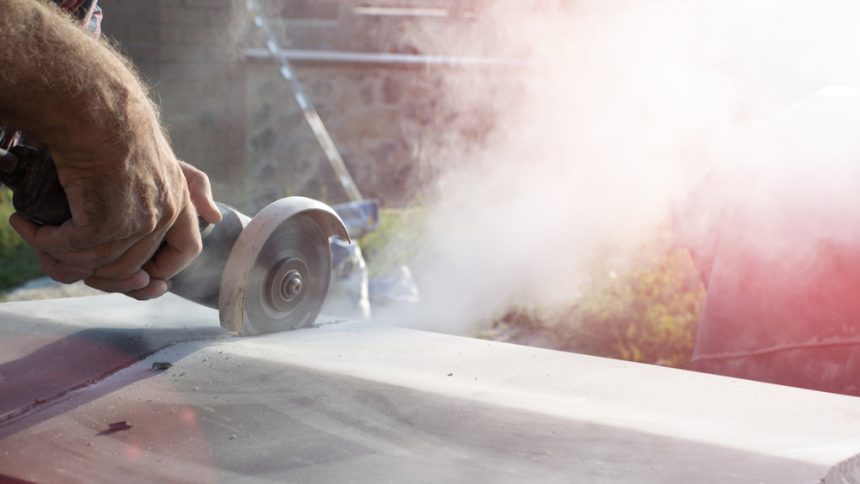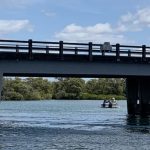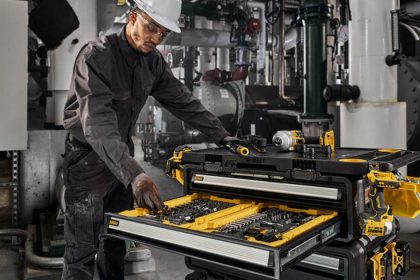With a nationwide ban on engineered stone looming, Aussie tradies have been warned against taking shortcuts in a rush to finish outstanding jobs.
The message comes ahead of a world-first ban on the popular benchtop product after years of campaigning from Australia’s unions and construction workers.
From July 1, tradies will no longer be able to carry out work that involves manufacturing, supplying, processing, or installing engineered stone.
State-by-state legislation is already in place to help limit the health risks of the material.
Businesses involved in its production and installation must hold a licence; meanwhile, the uncontrolled dry-cutting of manufactured stone is outlawed entirely.
Despite a ban being just months away, WorkSafe Victoria has now reminded tradies of the consequences that complacency with the deadly benchtop product could have.
WorkSafe Executive Director Health and Safety Narelle Beer reminded employers to comply with the state’s strict engineered stone requirements before the ban.
“Banning the use of engineered stone will save lives – but we don’t want to see workers put at additional risk as employers rush to finish work and process engineered stone ahead of the national ban,” she said.
“It’s crucial that employers continue to protect themselves and their workers, and WorkSafe will continue to champion this issue as the engineered stone ban approaches.”
WorkSafe NSW first to drop tools on Silica-safety
The WorkSafe Victoria warning comes with a layer of irony after the NSW arm of the work safety authority was criticised last week for it’s own safety shortcuts, launching it’s award-winning silica dust-detecting device well before it was market-ready.
WorkSafe NSW claimed it could detect fine silica particles on worksites and help protect workers from the potentially deadly silicosis disease, despite concerns regarding the validity of its testing.
Typically found in kitchens and bathrooms, the deadly building material decimates the lives of hundreds of tradies every year.
Ultra-fine silica dust produced while cutting the stone can lead to silicosis, a deadly disease, with current estimates predicting 100,000 tradies will develop the condition in their lifetime.
Dr Beer warned tradies that the risks of working unsafely with engineered stone products extended past potential fines, with the Victorian already seeing 669 silicosis diagnosed.
“Hundreds of Victorian tradies have already been diagnosed with silicosis – a debilitating and potentially deadly disease that can devastate young workers and their families,” Dr Beer said.
Dr Beer encouraged silicosis-concerned workers to take advantage of the free comprehensive health assessment at Melbourne’s Alfred Occupational Respiratory Clinic.
The clinic is Australia’s only dedicated public hospital occupational respiratory clinic and provides a range of diagnostic tools and specialist services, increasing the chance of early detection.
Meanwhile, a government-funded campaign raising awareness of the upcoming ban on engineered stone has begun, including direct messaging to licence holders, advertising in trade-related publications and regional outreach programs.
Fight turns to find cure
With the banning of the product now secure, the fight will turn to finding a cure of those currently suffering from the debilitating lung lisease.
Associate Professor Jane Bourke, who has conducted over 20 years of research on lung disease treatments at Monash University’s Respiratory Pharmacology labs is currently working on a novel human model for anti-fibrotic drug screening in silicosis.
Ms Bourke says it’s now time for campaigners to set their sights on finding a cure for those already cursed with the incurable disease.
“Ongoing monitoring of the estimated 10,000 Australians currently in the engineered stone workforce will still be required as more cases emerge due to prior exposure to this dangerous dust,” she explained.
“We must value lives ahead of industry profits as we continue our research to understand how this devastating disease damages the lungs and try to find effective treatments for those already affected.”
Modifications and removal will still be permitted post-ban
Once the ban takes effect, some states will have exceptions for the removal, repair, minor modification, and disposal of engineered stone products installed before the prohibition (legacy products),
The ban will not extend to engineered stone products with trace levels of crystalline silica (under 1 per cent).
Current Victorian engineered stone licences will remain valid as work continues to raise awareness of the ban and its impact on the stonemason industry before it comes into effect.







